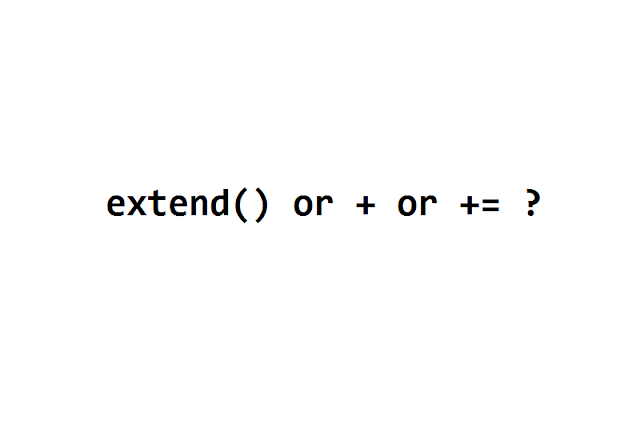What is the difference between list method extend() and operators + or += in Python
In Python, list support + and += operators. They could do the same thing as the method extend().
extend(): iterate through the iterable object and append each element from the iterable to the end of the list to be extended. Its parameter could be any iterable.
>>> a = ['a','b','c']
>>> b = ['x','y','z']
>>> a.extend(b)
>>> a
['a', 'b', 'c', 'x', 'y', 'z']
+ operator: instead of extending the list in place, it creates a new list leaving original list untouched; it is not as effcient as two others.
>>> b = ['x','y','z']
>>> a.extend(b)
>>> a
['a', 'b', 'c', 'x', 'y', 'z']
+ operator: instead of extending the list in place, it creates a new list leaving original list untouched; it is not as effcient as two others.
>>> a = ['a','b','c']
>>> b = ['x','y','z']
>>> c = a + b
>>> c
['a', 'b', 'c', 'x', 'y', 'z']
>>> b = ['x','y','z']
>>> c = a + b
>>> c
['a', 'b', 'c', 'x', 'y', 'z']
+= operator: it extends the list in place which is the same as the extend() method.
>>> a = ['a','b','c']
>>> b = ['x','y','z']
>>> a += b
>>> a
['a', 'b', 'c', 'x', 'y', 'z']
>>>
>>> b = ['x','y','z']
>>> a += b
>>> a
['a', 'b', 'c', 'x', 'y', 'z']
>>>
Another difference need to be noted. The operands comes with + operators must be both lists, otherwise TypeError will be raised. While the second operand of += operator could be any iterable.
>>> a = ['a','b','c']
>>> b = ('d','e','f')
>>> a+b
Traceback (most recent call last):
File "<pyshell#61>", line 1, in <module>
a+b
TypeError: can only concatenate list (not "tuple") to list
>>> a += b
>>> a
['a', 'b', 'c', 'd', 'e', 'f']



Comments
Post a Comment